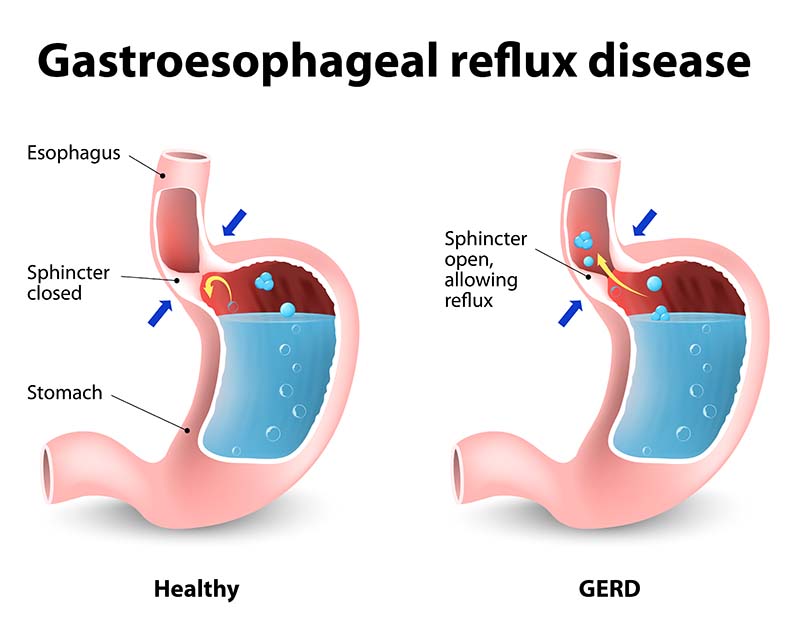What Causes GERD in Kids?
Gastroesophageal reflux disease (GERD) in kids is usually caused by immaturity of the LES that results in weakness of the muscle. However, certain foods, medications, developmental disorders and underlying diseases can also cause GERD in children.
Foods that can cause GERD
Some foods seem to affect the muscle tone of the lower esophageal sphincter (LES), allowing it to stay open longer than normal. These include, but are not limited to:
- Chocolate
- Carbonated drinks
- High-fat foods.
Other foods increase acid production in the stomach, resulting in heartburn when reflux occurs, including:
- Citrus foods
- Tomatoes and tomato sauces
- Spicy foods.
Medications that can cause GERD
Medications and dietary supplements that can irritate your child’s esophagus and lead to GERD include:
- Antibiotics, such as tetracycline and clindamycin
- Bisphosphonates taken orally, such as alendronate (Fosamax), ibandronate (Boniva) and risedronate (Actonel, Atelvia)
- Iron supplements
- Potassium supplements
- Quinidine
- Pain relievers, such as Ibuprofen, Advil, Motrin and Aspirin
If your child has GERD, ask their doctor if medications they take may affect their symptoms.
Risk Factors for GERD
The following conditions may increase the likelihood of your child developing GERD:
- Birth defects
- Premature birth
- Down syndrome
- Cerebral palsy
- Head injury
- Food allergies
- Obesity
- Exposure to tobacco smoke
- Narrow or short esophagus
- Eosinophilic esophagitis
What is eosinophilic esophagitis?
Eosinophilic esophagitis also known as EoE, is a disease in which eosinophils (allergy cells) build up in the lining of the esophagus. Although the cause is not clear, research has shown a strong connection between food allergies and EoE. Environmental allergens may also play a role in this disease but more research is needed. Many patients with EoE also experience gastroesophageal reflux disease (GERD). Learn more about the Eosinophilic Esophagitis Program at CHOC.
Why is GERD a Concern in Kids?
GERD is a concern in kids because when stomach contents come up into the esophagus during reflux, infants and children can experience difficulty breathing, episodes of pneumonia and chronic coughing or wheezing. Although rare, infants and children can stop breathing for brief moments due to episodes of gastroesophageal reflux.
GERD symptoms
Heartburn, also called acid indigestion, is the most common symptom of GERD. Heartburn is described as a burning chest pain that begins behind the breastbone and moves upward to the neck and throat. It can last as long as two hours and is often worse after eating. Lying down or bending over after a meal can also contribute to heartburn. Many children who are diagnosed with GERD will experience a dry cough, wheezing or trouble swallowing, instead of classic heartburn. Although each child may experience symptoms differently, signs of GERD in infants can include:
- Fussiness around mealtimes
- Hiccups
- Refusal to eat
- Frequent vomiting
- Gagging.
Symptoms in children may include:
- Belching
- Stomachache
- Choking
- Frequent cough
- Coughing fits at night
- Wheezing
- Frequent upper respiratory infections (colds)
- Frequent ear infections
- Rattling in the chest
- Frequent sore throat in the morning
- Sour taste in the mouth.
The symptoms of GERD often resemble those of other gastrointestinal conditions, including eosinophilic esophagitis. At CHOC, we thoroughly assess each patient to ensure proper diagnosis.














